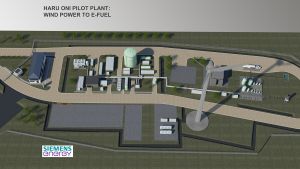Batteries are the main power source that vehicle manufacturers and governments around the world consider feasible for new cars in the future, but Porsche is to build a factory producing eFuels, hinting that carbon-neutral synthetic petrol and diesel have a role to play, too.
Synthetic fuels, or eFuels, are compatible with conventional internal combustion engines, and can be produced via carbon-neutral processes that potentially offset the carbon dioxide (CO2) generated when the fuels are burnt.
Porsche is teaming up with German industrial giant Siemens, energy firms Enel and AME, and petroleum company ENAP to build a pilot factory in Magallanes, southern Chile. The plant will initially produce just 130,000 litres of eFuel by 2022, with a target of 55 million litres a year by 2024, and 550 million litres by 2026. Those amounts are minuscule, given that figures from the Petrol Retailers’ Association show that the UK alone uses 46.5 billion litres of petrol and diesel every year.
But Porsche’s project indicates that reports of the death of internal combustion-engined cars may be exaggerated. Synthetic fuels are often talked about as an alternative for aircraft, ships, heavy goods and construction vehicles, where batteries, which lack the energy density of conventional fuel, are not currently viable. Porsche’s Chilean eFuels will be used in motorsports, at Porsche Experience Centres and in production cars.
The Haru Oni plant in Chile will take advantage of the region’s strong winds to generate clean electricity from turbines built by Siemens. Fuel will be made at the plant by using wind power to dissociate hydrogen and oxygen molecules from water, with CO2 filtered from the air being combined with the hydrogen to make synthetic fuel.

The factory is being funded with an initial 20 million Euros (£18m) from Porsche, plus eight million Euros (£7.2m) from the German government. Porsche’s chief executive, Oliver Blume, said eFuels are a “worthwhile complement” to electric cars, and “an additional element on the road to decarbonisation”.
“As a maker of efficient, high-performance engines, we have broad technical expertise,” Blume added. “We know what fuel characteristics our engines need in order to operate with minimal impact on the climate.”
Christian Bruch, CEO of Siemens Energy, called the German government’s support for the project “an important signal”.
What are efuels?
Petrol and diesel are hydrocarbons – they are composed of hydrogen and carbon atoms. But while conventional fuels are derived from oil, eFuels get their hydrogen from water and carbon from the air, with these elements then combined to mimic the structure of petrol, diesel and other oil-derived fuels. The energy used to create synthetic fuels can be renewable, and while burning them generates carbon dioxide (CO2), capturing carbon from the atmosphere during synthesis can offset this. eFuels can also be a good way of storing energy generated by renewable sources during times of low demand.
Synthesising eFuels is expensive, though. A single litre of diesel eFuel costs £4 before taxes, according to the Royal Society scientific institute. While such fuels have been around for a century or so, producing them on a meaningful scale globally is also a challenge. Costs could be reduced with further development and economies of scale, but critics highlight that in addition to the significant expense they bring, the cleanliness and carbon neutrality of eFuels relies on several assumptions being made about their production, as well as how and where they are burnt.
Could you live with an electric car? Read our story on the pros and cons of owning an EV today...
from Sitewide RSS feed https://bit.ly/38koPjB
Comments
Post a Comment